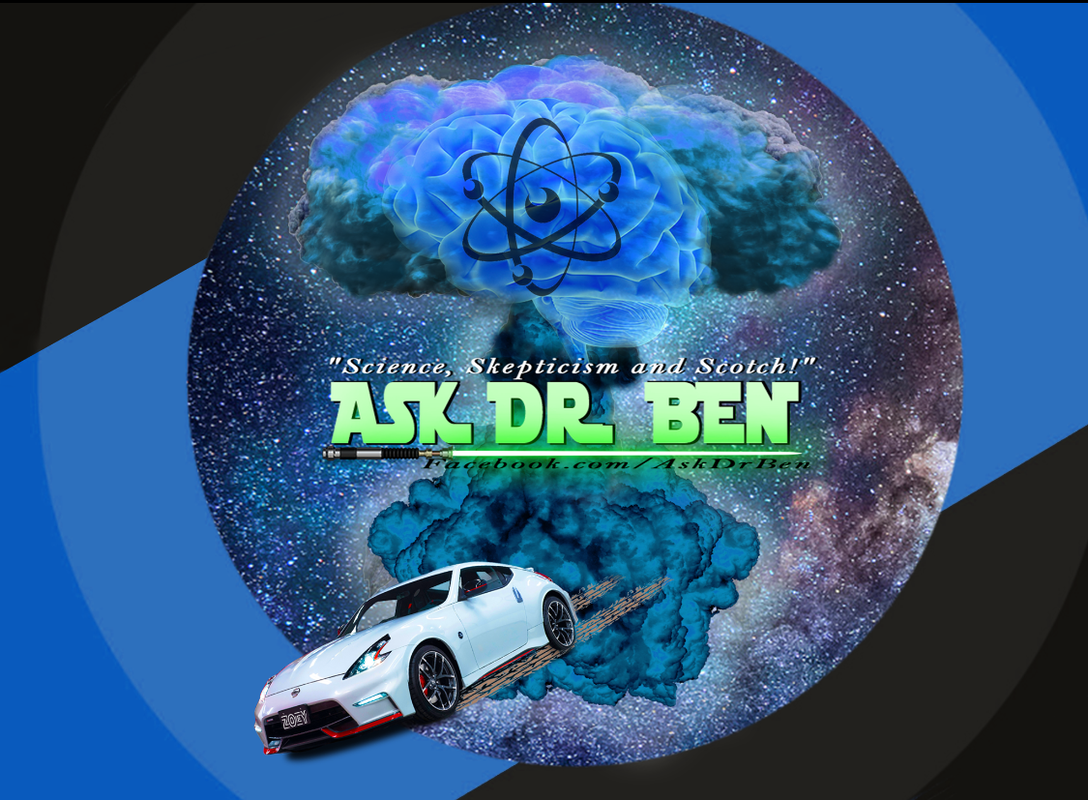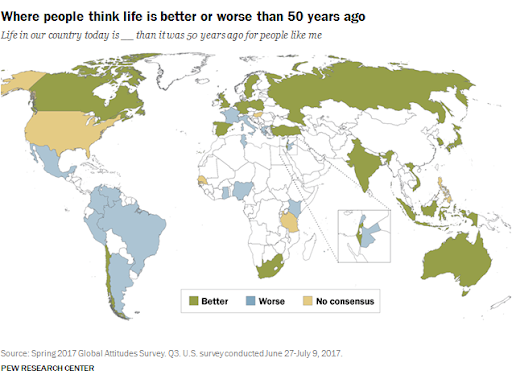|
I usually like to think of myself as a purveyor of hope, so about once per year I’ll write an article or give a talk about why the world is NOT ending (or perhaps just steal someone else’s writings). But I’m really not a pollyanna here. I like hope. I see its value. But there’s hope, and then there’s fact. And I’m more than happy to back up what I say with facts. I’m not a good salesman; I can’t seem to convince anyone to do anything, but I can report the facts and let you draw your own conclusions. I can tell you that even though most people obviously think it’s cool and edgy to be cynical about the world, I don’t like what it seems to be doing to our collective psyche. And I don’t feel like it’s productive for any of us. Yes, see the world as it is, but don’t forget to look at the good parts while you’re at it. So, let’s talk first about that which we despise the most: death. Most of us have very immature views on death. Death is a necessary part of evolution. It takes away the ones we love the most (including ourselves in the end), but it makes room for new life and ultimately new paradigms as old standards are replaced in favor of new ones. To hate death is to hate change, but I don’t think anyone really wants to live in a static universe. Now that’s all well and good, so let’s then talk specifically about untimely death, starting with death from war. Here, we see battle-related deaths since the end of WW2. It’s even more impressive when viewed over most of history (and normalized for world population), but the data is less accurate, so we’ll just stick with the last 75 years. https://ourworldindata.org/grapher/battle-related-deaths-in-state-based-conflicts-since-1946-by-world-region If you live in the Middle East, you might have some cause for complaint, but even so, you’re living in Eden compared to the late seventies. With a total max of 100,000, your overall odds of dying in war over the last 20 years are around 0.002 percent. So, OK. If institutionalized violence seems to be on a downward trend, what of individual violence? It seems that, at least pre-Covid, we heard about mass shootings almost weekly. Again, the raw data doesn’t seem to paint the same picture that the six o’ clock news might. https://ourworldindata.org/homicides This particular graph (above) spans 700 years of history (Western Europe). For completeness, let us also look at the relative upstart United States -- its homicide rate -- guns, frontier mentality and all, is 5.35 per 100,000 (2017). That is indeed about five times worse than Europe on average, but it’s still a very small number when viewed historically. https://ourworldindata.org/homicides Most people probably understand that, thanks to medical science, untimely death from disease is on a downward trend as well. Hearing the word “cancer” from an MD was once considered a veritable death sentence, but now, not so much. Because of the wide range of cancer types and the fact that many were never diagnosed prior to death 50 years ago, it’s difficult to describe survival rates with a single graph. However the one below does do a good job of making the case. https://ourworldindata.org/cancer-death-rates-are-falling-five-year-survival-rates-are-rising I’m getting long-winded, so we’ll leave cancer as our proxy for disease in this part of the discussion. Suffice it to say that improvements in medical care have increased survival rates of practically all diseases by around 50 percent over the last 50 years. When you consider that, mathematically, “100 percent” represents an asymptotic limit that can never be crossed, a “half again” improvement on average should truly be viewed as a staggering amount of progress. Personally, I’m also a fan of minimally invasive surgery, which is a byproduct of fiber optics and tool miniaturization. If they can repair a bad heart valve, or remove a tumor without cracking your ribcage open to do it, then you live in a golden age. Finally, there’s an easy way to see if the proof is truly in the pudding here. If the historical causes of death are decreasing (and not being replaced by something else), overall life expectancy should be measurably improving. And here we come to our next exhibit. https://ourworldindata.org/life-expectancy Basically, the above graphic shows that since 1800, for every 50 years of human progress, life expectancy has increased by 10 years or so. Put another way, progress pays us all a 20 percent life bonus for every year we survive. One of my favorite quotes from a history book is from Will and Ariel Durant’s, The Lessons of History (1968): If the prolongation of life indicates better control of the environment, then the tables of mortality proclaim the advance of man, for longevity in European and American whites has tripled in the last three centuries. Fifty years later, undertakers remain unhappy, and progress remains real. An added 1.2 years of life expectancy for every year lived may not quite be a prescription for immortality (even the Tolkien version), but it’s nothing to be sneezed at either. What of quality of life, then? If we’re all just mindless slaves to The Matrix or perpetually impoverished serfs subjugated to the mere 1 percent who have it good, that’s an end of the world scenario of sorts. It’s difficult to find good, overall metrics here, but I did come across an article about a worldwide poll that asked, “Is your country better off now than 50 years ago?” I found the results interesting but not very surprising. Most of Europe and Asia signal with a pretty definite “yes.” The French, being the French, remain perpetually unhappy, and the United States is ambivalent overall. The results of the poll are often best interpreted by the people compiling the data. The following quote speaks volumes to me: While the correlation between economic outlook and positive responses about life today was strong for most countries surveyed, it was not true in all cases — including the United States. "There are countries which, if you look at objectively, are doing well economically but [respondents] still said that life was worse today than it was 50 years ago," says Poushter. "Oftentimes, you see ... more issues with politics, issues with relatively more recent history, in terms of people more upset about where they are compared to 50 years ago." Among U.S. respondents, 37 percent said their lives are better, and 41 percent said they are worse. A lot of that comes down to political divisions, says Poushter. "It's just that in the last year, Republicans have become more likely to say life is better off, and Democrats have become less likely to say their lives are better off," he says. The article goes on to explain that our French (and likely, Italian) brethren have similar angst based solely on the political environment and not their actual quality of life. The problem in South America is an article unto itself, but suffice it to say that it’s understandable why many of them don’t have good feelings about their current situation, particularly Venezuela. But for most of the world, life is better, and they know it. And herein lies my impetus for this article. Many of us have lost perspective due to the groups we immerse ourselves in. It’s always best to remember that MOST people are good at heart. They’re not out to ruin your life. They just have experienced life differently, and they are a jumble of a different set of fears than yours, because sadly, fear is what motivates people the most. We all need to start by remembering that we don’t work 12-hour days fighting to keep food on our table, or the huns at bay. Those battles were fought, and won, on our behalf countless years ago.
In conclusion, I think part of the problem is that good things tend to happen over time. They’re not dramatic and sudden like a building exploding in Beirut. So it’s natural not to notice goodness as readily as destruction. As Socrates said, "There is only one good, knowledge, and one evil, ignorance." Don’t get so wrapped up in the nightly news, or Facebook, that you become ignorant of our progress, every day, inexorably. Further Reading https://www.wunc.org/post/world-actually-safer-ever-and-heres-data-prove https://www.npr.org/sections/parallels/2017/12/05/568288743/is-life-better-now-than-50-years-ago-the-answer-may-depend-on-the-economy https://www.castlechurchbrewing.com/blog/the-world-is-safer-than-ever-before-so-why-all-the-fear
0 Comments
Leave a Reply. |
STEM MattersIt seems like in the 50’s and 60’s, “gee whiz” science and technology books and shows abounded. Now, it seems like it’s become trite to most people, old and young. I’d like to reverse that trend in whatever way I can. Technical skills matter. Zeal for science and general understanding of the universe matter. If we lose sight of that as a society, then WE will fail to matter. |







 RSS Feed
RSS Feed
